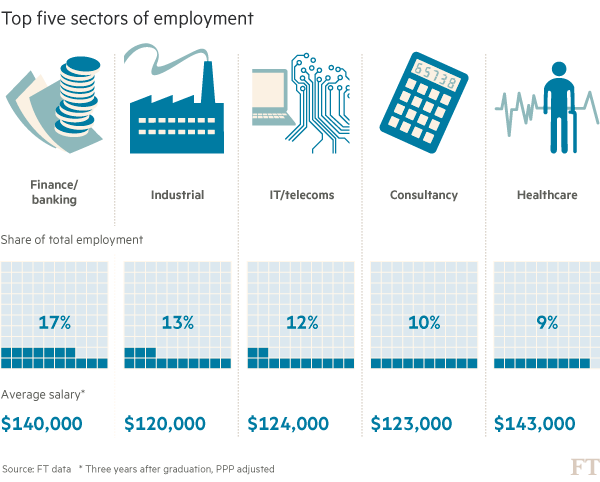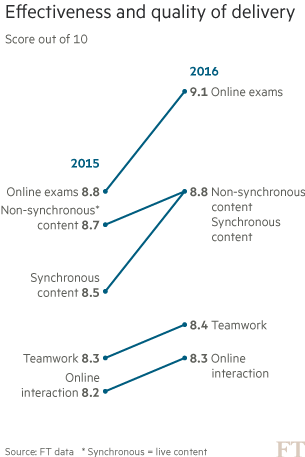IE Business School’s online MBA comes top for the third time

Simply sign up to the Business education myFT Digest -- delivered directly to your inbox.
Spanish business school IE has scored a hat-trick by reaching the top spot in the Financial Times ranking of online MBA programmes for the third year in a row. IE came in ahead of the UK’s Warwick Business School, ranked number two for the third year running, and the University of Florida Hough business school in third place.
The 15 ranked online MBA programmes provide flexible study options for working executives, who can expect to graduate with the same qualification as their full-time, residential MBA counterparts.
While the FT online and full-time MBAs are not strictly comparable because the criteria used to judge them are slightly different, it is interesting to note that IE and Warwick Business School are among six schools to feature in both rankings.

IE’s online MBA consistently attracts high-calibre students. Half of IE’s alumni were senior managers when they enrolled, the highest proportion among ranked schools at that stage. Three years after graduation they were earning the highest average salary at $179,000, about $30,000 more than the next highest earners — alumni from Olin Graduate School of Business at Babson College.
IE’s alumni have the second-highest average salary increase following graduation, at 39 per cent. The school is ranked first for aims achieved and for international mobility. It is third for career progress. “There is a definite ‘before and after’ for career progression,” says one former student. “Post-MBA I felt I had more of a sense of direction not only of where I wanted to be, but also why, and how to make it happen.”

The same seven schools continue to dominate the top half of the ranking. AGSM at UNSW Business School of Australia entered the ranking for the first time in eighth position.
A minimum of 70 per cent of the content must be delivered online in order for programmes to be eligible for the online ranking. Nine out of the 15 ranked schools had no requirement to study on campus at all. The remaining six schools insisted their students attend weekend or week-long residential classes.
Schools relied on a wide range of technologies to ensure lively interactive delivery of their programmes including virtual classrooms, live sessions and multimedia teaching materials. Alumni were asked to rate delivery as well as indicate how effective online exams were. Results were encouraging. Schools appear to be getting better at online delivery. Every aspect of online delivery was rated higher than it had been in previous years, showing a greater level of satisfaction.
“I was quite sceptical initially in doing an online course but the communication and online interaction were perfect,” says one graduate from AGSM.
Overall, live and recorded content achieved equal scores overall of 8.8 out of 10, while online interaction and teamwork were rated marginally lower.
Part of the appeal of online programmes lies in their flexibility, reach and slower pace of delivery than campus-based MBAs. Apart from IE, which imposes an 18-month time limit, participants have on average about five years to complete their degrees.
Having longer does not seem to make it easier, however. Proper time management is essential in order to maintain the momentum. “A couple of obligatory projects would help keep the pace and avoid a very intense last quarter,” commented one graduate from Warwick Business School. Overall, the graduates from the class of 2012 took slightly longer than 2.5 years to graduate.
Online programmes appeal more to senior professional students than those who take full-time programmes. Participants on online MBAs are aged 34 on average compared to 28 for full-time participants. Online students are also more likely to seek a promotion following the course with their existing employer. While the majority of full-time MBA graduates (90 per cent) worked for different companies three years after graduation, only about 55 per cent of online graduates did so.
They are also less likely to seek employment in a different sector after graduation. Only 30 per cent changed industry sector compared with nearly two-thirds of full-time MBA students.
One might expect that online programmes would appeal proportionately more to women than full-time programmes due to their flexibility. However, data from the 2016 rankings show that women account for 30 per cent of enrolled students compared with 35 per cent for full-time programmes.
This article has been corrected after original publication to state that University of Florida: Hough and not Durham University Business School was placed third in the rankings
Comments